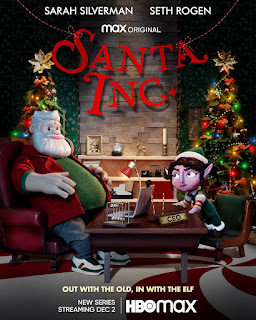Santa Inc.: Season 1 (2021)
I should note Santa Inc. is an 8-episode stop-motion series streaming on HBO Max. The premise, as implied by the title, concerns a corporate version of Santa's operation, staffed by magic creatures but (mostly) operating in a capitalist paradigm. If you're planning to watch this, be aware it's intended for mature audiences (though in my experience, shows made for mature audiences tend to be the least mature). I suspect there are plans to continue the series, though I have no idea whether this will build the buzz needed to justify that (I'm guessing between the animation and cast it's not cheap to produce). To be safe, I'm labeling this as "Season 1."
Seth Rogen voices Santa, or at least the current holder of that title. He's not actually the main character, though - that honor falls to Sarah Silverman's Candy, an elf who worked her way up to an executive position at Santa Inc. When her boss unexpectedly leaves for a job at Amazon, it positions Candy as the highest-ranking employee beside Santa himself. It also leaves the line of succession an open question, and Candy puts her hat in the ring. If selected, she'd be the first woman to ever hold the job.
The first half of the series is mainly concerned with her attempts to secure the position, which she nearly does before losing it to her own intern. The ending then pivots to her orchestrating a walkout in order to get the factory employees better working conditions and benefits. If that sounds like a bit of a change in thematic direction, you're on the right track.
Santa Inc. is a frustrating watch for a number of reasons, the largest being its inability to stick with its own story and say something substantial. Candy's arc is one of a woman who overcomes systemic barricades preventing women from achieving power, only to discover the assets necessary to overcome those obstacles make her too "unlikeable" to be ultimately chosen to lead. That's a powerful story with real-world application. Pity they failed to follow through.
Instead, the series changes direction, focusing on widespread economic inequality and corruption. To be fair, these ideas were seeded throughout, but they mostly came off as throwaway jokes, rather than anything serious. This ties into another issue with the show we'll cover in a moment. For the time being, let's stick with the shift in direction.
Instead of actually exploring the idea that the patriarchal system creates a catch-22 making it impossible for a woman to actually end up in power, we retread the old "character gets a taste of power and loses perspective" story. Setting aside the fact it's kind of a cliche, this doesn't really work here because for the bulk of the series virtually everyone behaves reprehensibly, to the point it feels like background noise. Why are we supposed to laugh off her mother's neglect and literal sex crimes, but hold Candy responsible for betraying her family? It feels arbitrary.
Let's move on to the humor. To be fair, a lot of this is funny. The problem is the style of comedy they're leaning on gets old. Jokes based on shock humor have a diminishing return, particularly when the same gross or taboo punchlines are recycled again and again. I think there's enough unique material here for a ninety-minute movie, but at more than twice that, this significantly outstays its welcome.
Which is honestly a shame, because this show looks fantastic. The stop motion is significantly better than you'd expect, particularly given the fact they don't limit themselves to a small number of sets. The designs are all well-thought-out and fun. They didn't cut corners when making this - it's a shame the same effort wasn't put into the scripts.
I want to call out the third episode, a large part of which was spent in Easter, as a high point. The change of scenery was great, and the new characters were fun (including a guest spot for Patton Oswalt). Like the rest of the series, this episode could have used more restraint around the humor, but I found myself laughing several times and enjoying the weirdness of it all.
I feel I should also mention the series's weirdest sequence. Towards the end, Candy accidentally hits a reindeer named Junior with her car. Junior is basically Rudolph (or maybe Rudolph's son - the show is a bit inconsistent). He's sexist, racist against elves, and kind of a jerk throughout. She's initially going to call an ambulance, despite the fact doing so will have a detrimental impact on her plans, then stops when he continues berating her while lying in pain. Instead, she coldly stands over him and seemingly watches him die (though a stinger in the credits implies he might still be alive, which will likely be a major plot point if another season materializes). This sequence is sort of intriguing - tonally, it's completely different from anything else in the series. At the same time, it really doesn't make sense. This moment has narrative weight that isn't present during others when people die (the aforementioned Easter episode ends in a bloodbath). It's a really good sequence on its own, but it probably doesn't belong in this series.
As a whole, this show isn't bad, but it feels desperate to maintain a constant level of humor, and as a result, it's far less funny than it could have been. It gets in its own way, sabotaging character, theme, and story and resulting in a fairly mediocre product despite some great visuals.
Ultimately, I really can't recommend this. But, again, I don't smoke pot, so maybe I'm not the best person to be reviewing it.


Comments
Post a Comment